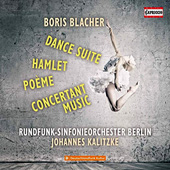
ESSENTIAL RECORDINGS

Fürstin Tarakanowa Suite, Op. 19a: I. Overture
Demeter Suite
- No. 4. Adagio
- Variation 2: Moderato
Lysistrata Suite, Op. 34a: No. 4 and 5 (arr. J. Kalitzke for orchestra)
Poème
Hamlet, Op. 17
Concertante Musik, Op. 10
During his early formative years, Manchurian born German composer Boris Blacher (1903-1975) supported himself writing arrangements for popular and film music. That may explain the ever so slightly "jazzy" feel and constant rhythmic agitation within some of his music. (In the early days of cinema the music had to replicate the action on the screen). For example the main motif of the Concertante Musik, Op. 10 has a jazzy, syncopated rhythmic sequence to it somewhat like Stravinsky's Ebony Concerto, and over its duration, differing instrumental groups play off this sequence in a somewhat improvisatory fashion. This all makes for a very cohesive and forward moving piece that combines the Stravinsky influence with the jauntiness of Darius Milhaud. On the other hand, the 1974 Poème, of which this seems to be the only recording, opens and closes in a nebulous, shapeless haze. While the Lysistrata Suite, again in what seems to be a première recording, fully displays Blacher's masterful propensity at blending together opposite and complex rhythm patterns in a very effective fashion.
Boris Blacher's sphere of influence went off the rails for a while due to his support for the Nazi movement. His music was eventually labeled as 'degenerate', but following his appointment as the President of the Berlin Academy of Arts in the 1950s, his reputation was quickly re-established. Aside from the slight Stravinsky semblance, his style of writing is quite unique. It's music that begs our attention from start to finish, for it is far from being static and repetitive. At any given moment, something dynamic is happening, something is changing, but in the end, if you were following attentively, it all comes together quite nicely.
The recording was done at the Jesus-Christus-Kirche in Berlin and has a nice, spacious feel to it with plenty of headroom. Composer/conductor Johannes Kalitzke seems to be in his element here, as he marshals the members of the Rundfunk-Sinfonieorchester Berlin to evince even the slightest details from the printed page.
Jean-Yves Duperron - August 2018